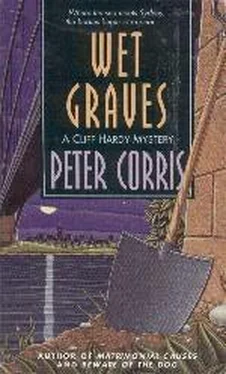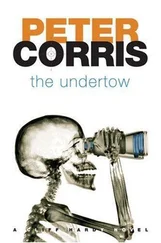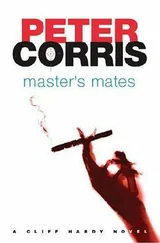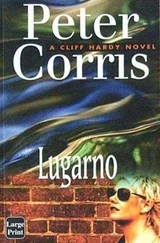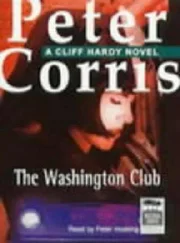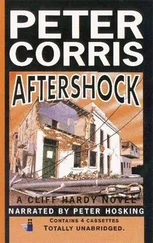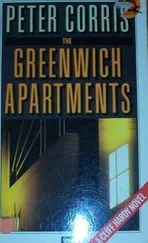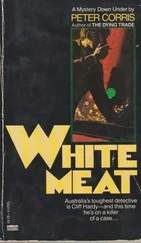Peter Corris - Wet Graves
Здесь есть возможность читать онлайн «Peter Corris - Wet Graves» весь текст электронной книги совершенно бесплатно (целиком полную версию без сокращений). В некоторых случаях можно слушать аудио, скачать через торрент в формате fb2 и присутствует краткое содержание. Жанр: Криминальный детектив, на английском языке. Описание произведения, (предисловие) а так же отзывы посетителей доступны на портале библиотеки ЛибКат.
- Название:Wet Graves
- Автор:
- Жанр:
- Год:неизвестен
- ISBN:нет данных
- Рейтинг книги:5 / 5. Голосов: 1
-
Избранное:Добавить в избранное
- Отзывы:
-
Ваша оценка:
- 100
- 1
- 2
- 3
- 4
- 5
Wet Graves: краткое содержание, описание и аннотация
Предлагаем к чтению аннотацию, описание, краткое содержание или предисловие (зависит от того, что написал сам автор книги «Wet Graves»). Если вы не нашли необходимую информацию о книге — напишите в комментариях, мы постараемся отыскать её.
Wet Graves — читать онлайн бесплатно полную книгу (весь текст) целиком
Ниже представлен текст книги, разбитый по страницам. Система сохранения места последней прочитанной страницы, позволяет с удобством читать онлайн бесплатно книгу «Wet Graves», без необходимости каждый раз заново искать на чём Вы остановились. Поставьте закладку, и сможете в любой момент перейти на страницу, на которой закончили чтение.
Интервал:
Закладка:
The truck turned left and I got the view I’d been waiting for. It’s quite an eyeful- across the sparkling water to the shining city. The water seems to sanitise things, to make it seem that a city blessed with such a setting couldn’t possibly be a bad and dangerous place. We know better, of course; perhaps it’s the tension between the appearance and the reality that make the town exciting. I’ve said these things to people in loquacious moments and a common reply has been, “If you feel so hot for the water view, why haven’t you got one?” That’s a new Sydney sort of question. I give the old Sydney answer: “Because I like to look at it doesn’t mean I want to buy it.”
Milson’s Point is bisected by the Bradfield Highway. Madden’s flat was in the western sector at the high end of a short street with a view out over Lavender Bay. As in all older areas with a high proportion of flats, there wasn’t much space to park in the street. The residents, who haven’t got what the real estate agents call O.S.P., leave their cars at home and catch ferries and buses to work. They use their cars to go to shopping centres, beaches and football grounds at the weekends. I got a space across the road and down the slope from Number 27 and sat for a while to pick up the atmosphere of the street. Also, my head was still hurting and the view was restful. A few people came and went, mostly middle-aged or older. A motorcycle courier roared up, left his motor ticking and ran across to a small block of flats. He scanned the letterboxes and went up a short flight of steps three at a time. He was back and performing a tight U-turn within a minute. I should have taken his registration number-the next time I needed to send something by courier I wanted him.
I locked the Falcon and strolled across the street. Number 27 was a white stucco building of somewhat unusual design. It housed three flats, on top of each other facing the street; another flat at the back ran at right angles to the others. This one was on two levels and rather bigger. On the lower level there were French doors opening onto a small garden. The effective entrance was on the upper level, reached by a set of iron steps. Good view of the water from here, sliver of bridge, slice of Opera House. There was a small, tiled area at the top of the steps under a wooden pergola. Great place for breakfast-some weathered garden furniture, a few hardy vines in tubs and one black plastic flowerpot. If you were hoping for a secreted door key, this was the place to look.
I bent, lifted the pot and picked up the rusty key to flat 3. I knocked on the door and waited, as is only polite. Nothing. The key turned easily in the well-worn Yale lock, and I stepped into a short hallway which led to a series of smallish rooms which were dim because the blinds were drawn. The place had that closed up, no one-around-for-a-month smell that starts to soak into the carpets and curtains if it hangs about for much longer. I raised the blinds as I went quickly through the rooms, getting the feel of the place. There was a sitting room, a bedroom and a bathroom upstairs; downstairs was the kitchen, a smaller bedroom and a study. The flat was neat but not obsessively so- books and magazines sat on shelves and surfaces without their edges lined up; a few clothes hung over chairs in the main bedroom; there were papers on the study desk and rinsed but not washed dishes in the draining rack.
“Normal,” I said to myself, “very normal.”
On my second tour I paid more attention to detail: I examined the clothes which tended towards the casual but included a couple of good-quality suits and an ex-pensive overcoat; the books suggested an interest in modern political history and serious literature, with historical novels from a variety of periods thrown in for light relief. Madden’s golf shoes were pricey but not new, likewise his clubs, which were stored in a cupboard under the stairs. There were a couple of bottles of wine in a rack, a half-empty bottle of riesling and a couple of cans of beer in the fridge. I sat down at the study desk, opened the drawers and went through his papers like an auditor. I found ample evidence of an orderly, bill-paying person. A tax-paying person with a superannuation scheme to guarantee him a comfortable but not riotous retirement. Madden kept his credit card slips for tax purposes, and there was too big a stack of them to go through in detail. A quick shuffle showed nothing out of the ordinary. There was a registration paper for a 1987 Ford Laser with an expiry date in February of the current year. No evidence of renewal. Madden had a chequebook and a savings passbook with unremarkable balances, deposits and withdrawals. No diary, no medical bills out of the ordinary, no love letters or blackmail threats.
I found two photograph albums, neither very carefully kept or annotated. The pictures emphasised the normality and stability of Madden’s life-there was a continuity to them, a continuity of people and places from young adulthood to middle age. The only interruption to the even flow was the absence from the snapshots, dating from about thirty years back, of the bright-eyed, dark-haired young woman who had been Brian Madden’s wife. There were plenty of photographs of Louise, charting her growth from childhood to late teens. Only the odd picture from that point on. No shots from foreign holidays, no handsome schoolboys or young girls with old eyes.
A stack of letters lay on the living room table. I surmised that Louise had collected them on an earlier, worried visit to the flat and that there would be more now in the letterbox. I examined the letters but found nothing remarkable about them. The con-tents of most could be guessed from the envelopes-bills, subscriptions due, invitations, professional bumf. The telephone was on a shelf in the kitchen-stool beside it, pad for messages, address and telephone number book to hand. I’d recently met a young woman who didn’t know the telephone number of her own flat, which she shared with a couple of friends. When I asked her how she rang home, she said. “I’ve got the number on auto-dial at the office. I don’t need to know it.” None of that nonsense for Brian Madden-his phone was the old, dial-it-yourself model and his address and numbers book was as old as the phone.
I raised all the blinds in the kitchen and sat down at the table to leaf through the book. Madden had printed the surnames and street names, but the numbers and first names were written in a hurried scrawl that probably came from taking lecture notes and marking essays. He seemed to know a lot of people and had recorded a good many institutional and business numbers, but not more than you’d expect for a well-educated man with broad interests-a theatre booking agency, several restaurants and hotels, the State library and gallery, the ABC, David Jones, four taxi companies, two plumbers, an electrician and so on. I recognised some of the personal entries: the journalist Max Walsh, the cartoonist Bruce Petty. Several of the names were crossed out, and since these included those of George Munster and Xavier Herbert, I concluded that these people were dead. I’m not big on intuition, let alone premonition, but I felt something not rational or logical at work as I looked at that entry-’X. Herbert, Red Lynch, Queensland, 4899’, and the post office box number-with the firm lines passing through the letters, almost obliterating them. I sensed that Brian Madden was dead.
I put the address book down and went for another wander, in a sombre mood now, alert to different things, through the flat. Most of the rooms carried a picture or two on the walls. A few originals by artists I didn’t know; a couple of prints-a Roberts and a Streeton. Nice middle-of-the-road stuff. Over the small fireplace in the study there was a framed, enlarged-to-a-metre-square copy of the famous photograph that showed the two arches of the Sydney Harbour Bridge just before they were joined. The figures of workmen, right on top of the structure, stood out starkly against a light sky.
Читать дальшеИнтервал:
Закладка:
Похожие книги на «Wet Graves»
Представляем Вашему вниманию похожие книги на «Wet Graves» списком для выбора. Мы отобрали схожую по названию и смыслу литературу в надежде предоставить читателям больше вариантов отыскать новые, интересные, ещё непрочитанные произведения.
Обсуждение, отзывы о книге «Wet Graves» и просто собственные мнения читателей. Оставьте ваши комментарии, напишите, что Вы думаете о произведении, его смысле или главных героях. Укажите что конкретно понравилось, а что нет, и почему Вы так считаете.
